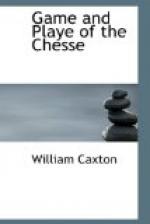dwelle and enhabite/ And they ought to considere yf
ther be ony thynge therein conteyned ayenst right
and reson/ and yf they fynde ony thinge contraire/
they ought to admoneste and warne them that gouerne/
that suche thynges may be chauged into better astate/
For custome establisshid ayenst good maners and agaynst
the fayth/ ought not to be holden by right. For
as hit is sayd in the decree in the chapitre to fore/
alle ordenance made ayenst ryght ought to be holden
for nought Alas who is now that aduocate or notaire
that hath charge to wryte and kepe sentence that putteth
his entente to kepe more the comyn prouffit or as
moche as his owen/ But alle drede of god is put a
back/ and they deceyue the symple men And drawen them
to the courtes disordinatly and constrayned them to
swere and make othes not couenable/ And in assemblyng
the peple thus to gyder they make moo traysons in
the cytees than they make good alyances And otherwhile
they deceyue their souerayns/ whan they may doo hit
couertly For ther is no thynge at this day that so
moche greueth rome and Italye as doth the college
of notaries and aduocates publicque For they ben not
of oon a corde/ Alas and in Engeland what hurte doon
the aduocats. men of lawe. And attorneyes of
court to the comyn peple of y’e royame as well
in the spirituell lawe as in the temporall/ how torne
they the lawe and statutes at their pleasir/ how ete
they the peple/ how enpouere they the comynte/ I suppose
that in alle Cristendom ar not so many pletars attorneys
and men of the lawe as ben in englond onely/ for yf
they were nombrid all that lange to the courtes of
the channcery kinges benche. comyn place. cheker.
ressayt and helle And the bagge berars of the same/
hit shold amounte to a grete multitude And how alle
thyse lyue & of whome. yf hit shold be vttrid & told/
hit shold not be beleuyd. For they entende to
theyr synguler wele and prouffyt and not to the comyn/
how well they ought to be of good wyll to gyder/ and
admoneste and warne the cytes eche in his right in
suche wise that they myght haue pees and loue one
with an other And tullius saith that frendshippe and
good wyll that one ought to haue ayenst an other for
the wele of hym that he loueth/ wyth the semblable
wylle of hym/ ought to be put forth to fore alle other
thynges/ And ther is no thynge so resemblynge and lyke
to the bees that maken honye ne so couenable in prosperite
and in aduersite as is loue/ For by loue gladly the
bees holden them to gyder/ And yf ony trespace to
that other anone they renne vpon the malefactour for
to punysshe hym/ And verray trewe loue faylleth neuer
for wele ne for euyll/ and the most swete and the
most confortynge thynge is for to haue a frende to
whom a man may saye his secrete/ as well as to hym
self/ But verayly amytye and frendship is somtyme
founded vpon som thinge delectable And this amytye
cometh of yongthe/ in the whiche dwelleth a disordinate
heete.




